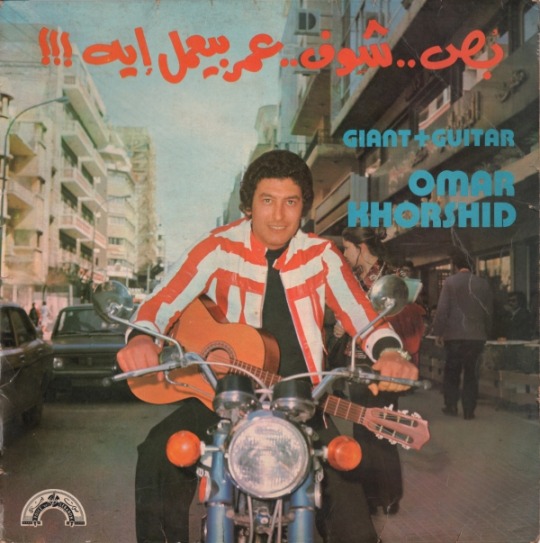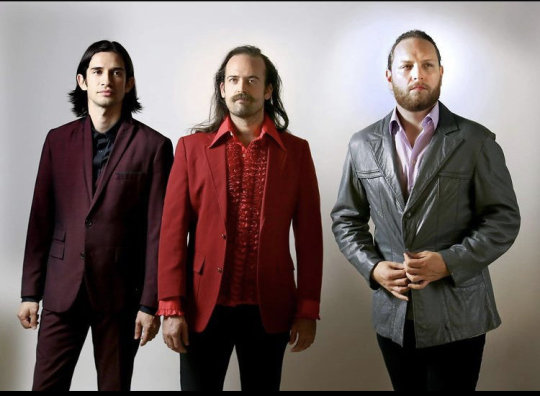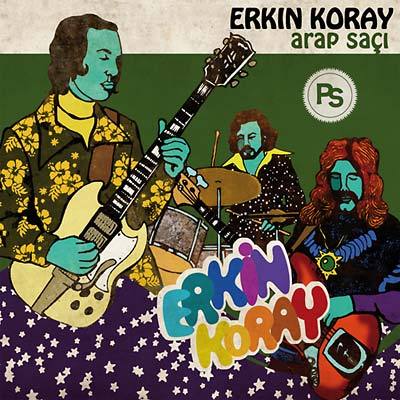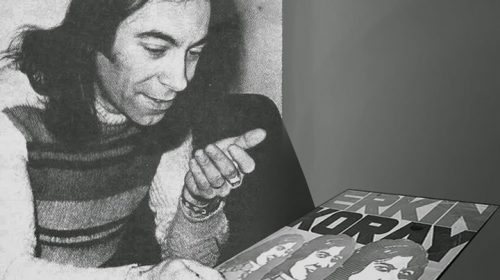Video
youtube
(via Omar Khorshid - Guitar El Chark (1974)
21 notes
·
View notes
Audio
Listen/purchase: Ghada by Baligh Hamdi
12 notes
·
View notes
Audio
Listen/purchase: Wadil Muluk [Valley Of The Kings] by Omar Khorshid
3 notes
·
View notes
Text
125: Omar Khorshid // Giant + Guitar

Giant + Guitar Omar Khorshid 1974, Voice of Lebanon
Released in 1974 in various markets as بص شوف ... عمر بيعمل إيه (Look, What is Omar Doing?) and Giant + Guitar, Omar Khorshid’s finest album was probably most widely heard under the title Rhythms from the Orient, a generic title attached to a generic sleeve featuring a pair of dancers dressed in a Harlequin paperback approximation of traditional Eastern finery. (And probably in brownface as well...) His previous recordings had been released in three volumes as Belly Dance with Omar Khorshid and His Magic Guitar, to capitalize on the Western appetite for the exotic. Without meaning to cast aspersions on belly dancing, a respected artform with a history that goes back centuries, marketing an album as groundbreaking as Giant + Guitar as Oriental mood music shows how little comprehension Western music buyers had of sounds outside their milieu. (And also why, even today, it never hurts to take a flier on a random foreign LP with a cheesy cover from the bargain bins: sometimes your finds will blow you away.)
youtube
Khorshid is credited with essentially introducing the electric guitar to Egyptian and Lebanese music through his work with major composers and bandleaders of the day, and his stated intention in forming his own instrumental band was to demonstrate that “the possibilities of the guitar go far beyond” what these more traditional musicians could comprehend. Consider “Takassim Sanatalfeyn.” If you’ve ever heard Dick Dale’s take on “Misirlou,” you have some sense of the primal rumble it’s possible to achieve using Eastern scales, but Khorshid’s playing is something else altogether. The composition flows from liquid contemplation through passages of extraordinary rigid intensity, his technique impeccable—like a well-provisioned merchant allowing the customer to sample all his wares, on “Takassim Sanatalfeyn” Khorshid gives you a little bit of everything he can do. In a sense, Khorshid was already a known commodity—to go further, he needed the guitar to be proven valid, and so he bent himself wholly to the task.
While Turkish guitarist Erkin Koray would kick off a revolution of his own with Elektronik Türküler, released in the same year, Koray’s acid rock was much more explicitly influenced by Western musicians like Hendrix than Khorshid’s music was. Khorshid knew of rock music (he covered a few standards like “Apache” and “Johnny Guitar” on his first album), but there is always the sense that his use of novel instruments like the electric guitar, electric keyboard, and synthesizer were intended to advance the development of new Eastern music, rather than to pull his country’s arts into the European sphere. It’s the difference between drawing from the vernacular of an oud player to introduce an Arabian scale on an electric guitar and playing an Arabian scale as a gimmick like Greg Lake would. Khorshid’s recordings of Arabic folk standards are some of the most exciting and fresh-sounding I’ve heard (“Ah Ya Zein” could go on thrice as long without diminishment), and to my mind Giant + Guitar stands among the best instrumental albums of all time.
youtube
125/365
#omar khorshid#arabian scales#egyptian music#eastern guitar#instrumental music#'70s music#arabic music#vinyl record#music review
0 notes
Text
Listed: Atlas Maior

Atlas Maior combines progressive jazz, Middle Eastern, Latin American and Indian music traditions in original songs that nod to tradition without being confined by it. Led by Joshua Thomson (alto saxophone, flutes) and Josh Peters (oud, lavta), the band will be releasing its next album, Hadal, in early 2023. Here is some of the music that inspires them.
Marcel Khalife—Taqasim
youtube
Khalife's song "Achikain" is currently featured during live Atlas Maior settings. Here Taqasim is a rare example of Marcel performing in a trio setting. Marcel Khalife would come and play Arab Fest in my hometown of Dearborn, MI. We were so fortunate to be able to host this Lebanese legend in our backyard.
Amir Elsaffar + Hyper
youtube
ElSaffar's work, approach, and sound has influenced the band for years. Fairly recently we've been in contact which has been incredible. He deserves every ounce of success that he receives with his phenomenal growing body of work. I also recommend the album Rivers of Sound.
Karim Ziad
youtube
The Maghreb region has influenced Atlas Maior stretching back to before the inception of the group. Here we represent this with Ifrikya. In 2014, our composition "iddaa!" was accepted as part of a live art sound installation within Moroccan taxi cabs for the Marrakech Biennale 5 Art Festival.
Ornette Coleman
youtube
Ornette! Ornette! Ornette! Our latest single Basalt is quite directly influenced by Ornette Coleman. Specifically ,the rubato melody we perform as the beginning melody. Also the fact that we have composed material incorporating two drum sets reminds me of his son Denardo Coleman.
Anour Brahem
youtube
This is such a beautiful album by one of the greats of the oud. Here, Brahem teams up with Holland and Dejohnette on a truly special performance. All of Brahem's albums are fantastic.
Tarek Yamani
youtube
Atlas Maior caught Yamani's La Merce 2019 Festival performance while we were also on tour in Spain. We were captivated by his approach to both Middle Eastern and Western jazz musical contexts. He is able to blend both approaches in such tasteful well thought out manner while demonstrating his command of both traditions.
Naseer Shamma
youtube
Tablas (both Egyptian, and East Indian) have always been a component of Atlas Maior going back to the beginning of the group in 2009. Today we explore the instrument in several of our live settings as the Atlas Maior Tabla Trio, and in the larger quintet setting. Indian and Pakistani music traditions have always inspired us. This is a fine example of Middle Eastern oud, and East Indian tablas.
Ken Vandermark
youtube
There are so many incredible Vandermark records, this one is just great also because of Atlas Maior's deep love of both Funkadelic and Sun Ra. I love the way he interprets these works in a trio setting.
Omar Khorshid
youtube
A long-time influence on the band. Many never think of Khorshid's approach to the electric guitar. His story, music history, and body of work are legendary in the Middle East.
Nusrat Fateh Ali Khan
youtube
Here I've selected a concert from Nusrat Fateh Ali Khan, whom I was into probably five years before forming Atlas Maior. I remember walking around Ann Arbor, MI during a blizzard listening to this album. The legendary Nusrat Fateh Ali Khan, definitely one of the world's most prolific voices in all of music history.
#dusted magazine#listed#atlas maior#Marcel Khalife#Amir Elsaffar + Hyper#Karim Ziad#ornette coleman#Anour Brahem#Tarek Yamani#Naseer Shamma#Ken Vandermark#Omar Khorshid#Nusrat Fateh Ali Khan
1 note
·
View note
Text
youtube
Omar Khorshid - Rhythms From The Orient
(1974, full album)
[Arabic Bellydance Music]
0 notes
Video
youtube
OMAR KHORSHID - 'Rakset El Fadaa' from "GIANT + GUITAR" (1974) OUT NOW O...
Today's Cultural Corner... Egypt's incredible artist, Omar Khorshid, who performed at the White House peace treaty, upon Sadat's invitation, despite unfortunately living in exile.
This track is an absolute epic masterpiece.
https://en.wikipedia.org/wiki/Omar_Khorshid
#OdedFriedGaon #OdedMusic #OdedTodaysCultureCorner
0 notes
Text

Baligh Hamdi - Instrumental Modal Pop of 1970s Egypt
A remarkable compilation from Sublime Frequencies — a label that's been bringing us remarkable compilations for close to two decades now. This one pulls together an hour's worth of gems from Baligh Hamdi, a prolific Arabic composer. Each tune here is packed with sinuous grooves, wiry guitar (courtesy of the master Omar Khorshid), and beguiling keyboard sounds (courtesy of another master Magdi al-Husseini). Evocative and imaginative, it'll take you to another place, another time.
17 notes
·
View notes
Video
youtube
(via Omar Khorshid - Raqset El Fada (1974)
17 notes
·
View notes
Text
211: Erkin Koray // Arap Saçı

Arap Saçı Erkin Koray 2021, Pharaway Sounds
Pharaway Sounds’ Arap Saçı (Arab Hair) collects 24 Erkin Koray tracks originally issued as singles between 1968 and 1976. Koray is best known in the West for his groundbreaking fusion of Anatolian/Arabic folk and classical with crunching psychedelic rock on his 1974 debut LP Elektronik Türküler. However, as Angela Sawyer’s tart liner notes observe, Turkey was predominantly a singles market at the time, and back home Koray did most of his damage on 7”. The limitations of the format, and the preferences of Koray’s record company, preclude the kind of long-form acid voyages he undertook on Elektronik Türküler, but he's able to generate plenty of smoke on these “pop” singles.
Highlights abound. Arap Saçı kicks off with 1973’s “Mesafaler” (“Distances”), a scorching psych banger complete with cowbell that only stops rocking to periodically gawp and stare fixedly into space for 20 or 30 seconds at a time before shaking itself awake to get back to business. (Is there footage of a Turkish TV performance featuring liquid light art? You bet your hairy ass there is.)
youtube
The waltzing, organ and hand drum-led “Komşu Kızı” (“Girl Nextdoor”) is a classic melancholy Middle Eastern ballad that hides a wild, surprising drop two-thirds of the way through; Koray freaks “Aşka İnanmıyorum” (“I Do Not Believe in Love”) with his insinuating croon and serpentine guitar licks; “Istemem” (“I Do Not Want”) mixes a light-stepping folk beat with some stinging solos that aren’t too far off what Uli Jon Roth would get up to in Germany with Scorpions a few years later. There really isn’t a bum track to be found.
This new compilation covers much of the same ground as the ‘70s Erkin Koray (AKA Mesafaler) and Erkin Koray 2 (AKA Şaşkın) singles compilations, and Pharaway Sounds opts to follow their track sequencing as closely as possible—a good choice, as they had a great flow, though a bit frustrating for those hoping to track Koray’s musical development chronologically. Regardless, we know that Koray was exposed to Western music as a young age, learning Occidental classical music on the piano as a child and discovering rock ‘n’ roll as a teen. According to the liners, Koray was performing songs by Elvis, Fats Domino, and Jerry Lee Lewis in the late ‘50s, and by the late ‘60s, when he began to emerge as a recording artist, he’d clearly imbibed industrial quantities of Hendrix, Cream, and the other usual psychonauts.

In a previous review, I briefly contrasted Koray with Egypt’s Omar Khorshid, a fellow guitar god and contemporary pioneer in electrified Arabic music. Khorshid had some familiarity with Western pop music, but he was working with the top stars in Arab folk and classical, using electric instruments to push traditional Eastern music forward rather than to fuse it with rock. Koray on the other hand was a long-haired freak who claims to have fought in the streets with a knife and joined Anglo-American-inspired combos with names like Mustard (Hardal) and Sweat (Ter). By the late ‘60s rock had become popular in Turkey, as had Arabesk music, which Sawyer describes as “a purposely uncouth… appropriation of Arabic pop and folk, popular with rural or marginalized folks who were suddenly encountering pockets of urbanized Europe in their backyard.” Koray intuitively crossbred the invasive genre (rock) with the reactionary one (Arabesk) and found himself one of the fathers of a powerful new mongrel breed of psych music.
youtube
By reissuing both Elektronik Türküler and these essential singles, Pharaway Sounds has done a real service to psych and non-Western rock aficionados. Koray makes a great gateway to the other masters of ‘70s Anatolian folk-rock, including Selda, Moğollar, and Barış Manço, a loose affiliation of artists that has been one of my most prized discoveries of recent years.
211/365
#erkin koray#turkish music#turkish rock#turkish psych#anatolian rock#anatolian psych#anatolian music#psych rock#heavy psych#psychedelia#'70s music#'60s music#pharaway sounds#music review#vinyl record#arab hair
8 notes
·
View notes
Text
youtube
🔥🌌🔥
14 notes
·
View notes
Text
Çok güzelsin çokkk 💃🏽
5 notes
·
View notes
Video
youtube
Omar Khorshid - Rakset El Fadaa
11 notes
·
View notes
